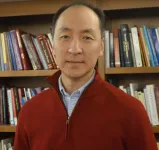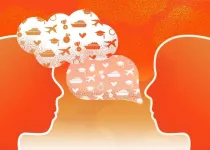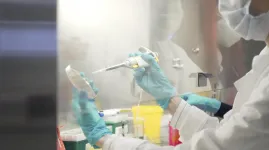(Press-News.org) CLEVELAND (March 5, 2021)--An international team of bioethicists and scientists, led by a researcher at Case Western Reserve University, contends it may be justified to go beyond the standing 14-day limit that restricts how long researchers can study human embryos in a dish. Going beyond this policy limit could lead to potential health and fertility benefits, and the authors provide a process for doing so.
In an article published March 5 in Science, Insoo Hyun, a bioethics professor at the Case Western Reserve University School of Medicine and the paper's lead author, and colleagues urge policymakers and the International Society for Stem Cell Research (ISSCR) to consider "a cautious, stepwise approach" to scientific exploration beyond the 14-day limit.
"But first," they write, "one must appreciate the scientific reasons for doing so. Any such proposed research must serve important goals that cannot be adequately met by other means."
ISSCR is expected to soon release updated guidelines for stem cell and embryo research.
Among the potential benefits of studying human embryos beyond the 14-day limit include understanding how early development disorders originate and developing therapies that address causes of infertility, developmental disorders and failed pregnancy.
Since the first successful birth from in vitro fertilization in the late 1970s, human embryo research has been subject to limits of time and developmental benchmarks. The general rationale for imposing those limits was that, although considered acceptable to benefit human health and improve reproduction, in vitro research should conclude 14 days after fertilization--about when implantation in the womb is normally completed.
National guidelines, laws and international norms have prohibited scientists from culturing human embryos for research after 14 days, or beyond the appearance of a structure called the "primitive streak," which defines the period when principal tissues of the body begin to form and an embryo can no longer divide into identical twins. Thus, the 14-day limit allowed research to proceed until the human embryo in a dish starts to become biologically unique.
When this limit was put in place, there were no methods to culture embryos in a dish for anywhere close to two weeks.
But research since 2016 shows that it is likely possible to culture human research embryos past the two-week limit, and suggests that doing so will yield scientific insights that could prove important for human health and fertility.
The authors acknowledge that researchers should adhere to the 14-day limit, "unless a strong scientific justification can be offered to culture human embryos longer in locales where it would be legally permissible to do so. Any such proposed research must serve important goals that cannot be adequately met by other means."
Hyun and colleagues propose six principles that can be used to weigh whether research on human embryos can move beyond the 14-day limit, in incremental, measured steps. They note their principles apply for extending the 14-day limit, but also for other complex research.
Among their principles, they emphasize that extended embryo culture should begin in small steps, with frequent interim evaluations. For instance, it would first be necessary to assess feasibility of culture past 14 days, and, if so, to assess whether those newly permitted experiments were informative enough to justify the further use of human embryos.
Their other principles include advocating for research proposals to be peer-reviewed by qualified and independent science and ethics committees; for public dialogue at the local institutional level and, more broadly.
"Realistically," they conclude, "an incremental approach seems to be our only path forward, both from a scientific and a policy standpoint."
INFORMATION:
The article's co-authors are: Annelien Bredenoord, at the University Medical Center Utrecht and Utrecht University in Utrecht, Netherlands; James Briscoe, at the Francis Crick Institute in London and The Company of Biologists in Cambridge, United Kingdom; Sigal Klipstein, at the University of Chicago Pritzker School of Medicine in Chicago; and Tao Tan at Kunming University of Science and Technology in Kunming, China.
Case Western Reserve University is one of the country's leading private research institutions. Located in Cleveland, we offer a unique combination of forward-thinking educational opportunities in an inspiring cultural setting. Our leading-edge faculty engage in teaching and research in a collaborative, hands-on environment. Our nationally recognized programs include arts and sciences, dental medicine, engineering, law, management, medicine, nursing and social work. About 5,100 undergraduate and 6,700 graduate students comprise our student body. Visit case.edu to see how Case Western Reserve thinks beyond the possible.
Did you daydream as a kid, maybe even get in trouble for it? If you find it harder to be pleasantly lost in your thoughts these days, you're not alone.
"This is part of our cognitive toolkit that's underdeveloped, and it's kind of sad," said Erin Westgate, Ph.D., a University of Florida psychology professor.
The ability to think for pleasure is important, and you can get better at it, Westgate says. The first step is recognizing that while it might look easy, daydreaming is surprisingly demanding.
"You have to be the actor, director, screenwriter and audience of a mental performance," she said. "Even though it looks like you're doing nothing, it's cognitively ...
ITHACA, N.Y. - Close friends are important drivers of adolescent behavior, including college attendance, according to Steven Alvarado, assistant professor of sociology in the College of Arts and Sciences.
In new research published March 4 in American Educational Research Journal, Alvarado reports that having college-bound friends increases the likelihood that a student will enroll in college. However, the effect of having college-bound friends is diminished for Black and Latino students compared with white and Asian students, especially for males and especially for selective and highly selective colleges, due to structural ...
Ever get stuck trying to solve a puzzle?
You look for a pattern, or a rule, and you just can't spot it. So you back up and start over.
That's your brain recognizing that your current strategy isn't working, and that you need a new way to solve the problem, according to new research from the University of Washington. With the help of about 200 puzzle-takers, a computer model and functional MRI (fMRI) images, researchers have learned more about the processes of reasoning and decision-making, pinpointing the brain pathway that springs into action when problem-solving ...
A newly discovered planet could be our best chance yet of studying rocky planet atmospheres outside the solar system, a new international study involving UNSW Sydney shows.
The planet, called Gliese 486b (pronounced Glee-seh), is a 'super-Earth': that is, a rocky planet bigger than Earth but smaller than ice giants like Neptune and Uranus. It orbits a red dwarf star around 26 light-years away, making it a close neighbour - galactically speaking.
With a piping-hot surface temperature of 430 degrees Celsius, Gliese 486b is too hot to support ...
COLUMBUS, Ohio - For Black girls in the juvenile justice system, attention from a caregiver might amount to too much of a bad thing, a recent study suggests.
Though parental attentiveness would generally be considered beneficial to troubled youths, the finding hints at the possibility that a history of trauma in a household's adults may filter down to younger generations, researchers say.
The study, examining how family and peer social support influenced post-traumatic stress disorder (PTSD) symptoms in Black girls who were in detention, found that lower self-esteem, less optimism about the future and higher negative behaviors by peers were associated with greater PTSD symptoms in these girls. But one more factor also correlated with those symptoms: a higher level of caregiver support.
"This ...
ARLINGTON HEIGHTS, IL (March 4, 2021) - Many new mothers with infants want very much to breastfeed as it is the gold standard for early nutrition. What to do when you find out your young child has a food allergy, and you are breastfeeding? A new study in Annals of Allergy, Asthma and Immunology, the scientific journal of the American College of Allergy, Asthma and Immunology (ACAAI), found that more than 28% of the women were given no guidance on whether they could eat the same food their breastfeeding child was allergic to.
"We found that guidance from healthcare practitioners for breastfeeding mothers in this situation ...
AMES, Iowa - Wind turbine blades spinning through cold, wet conditions can collect ice nearly a foot thick on the yard-wide tips of their blades.
That disrupts blade aerodynamics. That disrupts the balance of the entire turbine. And that can disrupt energy production by up to 80 percent, according to a recently published field study led by Hui Hu, Iowa State University's Martin C. Jischke Professor in Aerospace Engineering and director of the university's Aircraft Icing Physics and Anti-/De-icing Technology Laboratory.
Hu has been doing laboratory studies of turbine-blade icing for about 10 years, including performing experiments ...
HOUSTON - (March 4, 2021) - Federal and state governments auction leases to oil and gas companies to extract natural resources from public land. A revamp of the auction system -- utilizing a new model developed by a Rice University economist -- could lead to more competitive bids and, ultimately, more money for governments.
Yunmi Kong, an assistant professor of economics at Rice and the study's author, discussed her model in "Sequential Auctions with Synergy and Affiliation Across Auctions." The article appeared in the January 2021 edition of the Journal of Political Economy.
"Much of the oil- and gas-producing ...
Scientists from Skoltech and MSU have investigated antibiotic nybomycin that could prove effective against bacteria resistant to other antibiotics. Their research was published in the journal Antimicrobial Agents and Chemotherapy.
All bacterial cells contain topoisomerases, an important group of enzymes that help deal with spatial difficulties stemming from bacterial cell division associated with circular DNA replication. Topoisomerases can be of two types, I and II, depending on breaks they produce in DNA (one strand or double strand). Type II often acts as a target for antibiotics, including fluoroquinolones (FQ), a common group of antibiotics that comprises levofloxacin, ciprofloxacin, and others. Unfortunately, bacteria easily acquire resistance to ...
Managing single risk factors like blood pressure rather than looking at overall risk may be wasting scarce resources in countries where cardiovascular disease (CVD) is on the rise, according to a new study.
Researchers looked at country-specific levels of cardiovascular risk, associations with socio-demographic factors and whether WHO guidelines on the use of blood pressure medication were being followed across 45 low-income and middle-income countries (LMICs).
They found a higher risk of CVD in lower educated and non-employed people, an overuse of medicines in people at lower levels of CVD risk and an underuse of medicines in people at higher risk across ...




